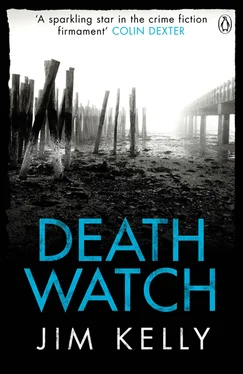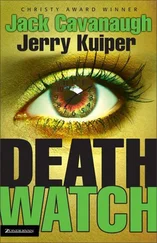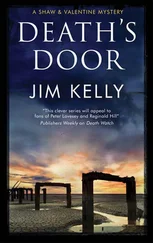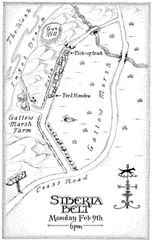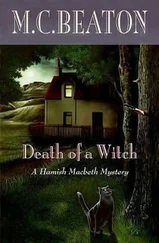Jim Kelly - Death Watch
Здесь есть возможность читать онлайн «Jim Kelly - Death Watch» весь текст электронной книги совершенно бесплатно (целиком полную версию без сокращений). В некоторых случаях можно слушать аудио, скачать через торрент в формате fb2 и присутствует краткое содержание. Жанр: Полицейский детектив, на английском языке. Описание произведения, (предисловие) а так же отзывы посетителей доступны на портале библиотеки ЛибКат.
- Название:Death Watch
- Автор:
- Жанр:
- Год:неизвестен
- ISBN:нет данных
- Рейтинг книги:3 / 5. Голосов: 1
-
Избранное:Добавить в избранное
- Отзывы:
-
Ваша оценка:
- 60
- 1
- 2
- 3
- 4
- 5
Death Watch: краткое содержание, описание и аннотация
Предлагаем к чтению аннотацию, описание, краткое содержание или предисловие (зависит от того, что написал сам автор книги «Death Watch»). Если вы не нашли необходимую информацию о книге — напишите в комментариях, мы постараемся отыскать её.
Death Watch — читать онлайн бесплатно полную книгу (весь текст) целиком
Ниже представлен текст книги, разбитый по страницам. Система сохранения места последней прочитанной страницы, позволяет с удобством читать онлайн бесплатно книгу «Death Watch», без необходимости каждый раз заново искать на чём Вы остановились. Поставьте закладку, и сможете в любой момент перейти на страницу, на которой закончили чтение.
Интервал:
Закладка:
‘I’d like their names, please,’ said Shaw. ‘The parishioners…’
Kennedy looked down, irritated. ‘Since we banned confetti we have to deal with this…’ He crunched something with his heel.
Shaw knelt quickly and picked up something, juggling it into the centre of his palm, holding it out for them to see.
It was a single grain of rice. Uncooked.
‘Rice?’ asked the man behind the counter of the all-night mobile kiosk. He wore a Chinese shirt, dragons and little willow-pattern bridges, but the accent was London overspill and he had Red Devils tattooed on one hand.
‘Chips,’ said Valentine. ‘Curry sauce.’ He didn’t recognize the man; normally it was a woman with cutaway gloves.
He took the tray and a plastic fork and left without saying anything, leaving the right money in loose change on the counter: 90p. It had been that price for a year now.
The quayside was deserted, it was 2 a.m, the light from the all-night takeaway spilling out to the railings over the water. Valentine touched the iron, a little ceremony of luck, then walked, picking at the food, until he got to South Lynn, the network of streets he’d lived in all his life. He put the tray of half-eaten chips into a bin, crunching it down so that the seagulls wouldn’t tear it back out.
His terraced house stood dark and still; but the street light outside his bedroom was on, buzzing like it always did. Briefly, he wondered if the power had been out here, then dismissed the thought. There was nothing in the fridge anyway.
In his imagination he could see into the rooms, through the bricks, as if it were a doll’s house standing
His keys were heavy in his pocket, and only a few minutes earlier he’d been dreaming of his bed, but now he couldn’t face it, because sleeping was about letting go, and he wasn’t very good at that. He walked on instead, past the corner shop and its security grille, to the graveyard of All Saints’. Someone had put an empty can of Special Brew on top of his wife’s gravestone. He sat on a bench and lobbed grit at it. He unpeeled the charity sticker from his lapel and stuck it on the stone. There were twenty, thirty, others in various states of rotting away, all over the granite surface.
Julie Anne Valentine 1955–1993
Asleep
The beer can clattered down on the tarmac path.
He walked; zigzagging through the terraced streets behind the London Road, trying to shake off the illusion that he was being followed, an illusion which haunted him now when he was alone, at night, in the silent streets. Near the old city gate there was a pub called the Honest Lawyer, the sign a headless clerk; closed down now, the windows stopped-up with breeze blocks. Beside it stood a funeral parlour. Granite stones in the window, lilies in
On the other side of the shop from the chapel was a house, two-up two-down, with a front door in matching gloss black. And beside that a set of garages: four roll-up doors. Valentine knew what was inside each: a sleek black car with glass panel sides for the coffin, a Daimler estate, and a glass-casket funeral coach; he’d often seen the plumed black horses pulling it towards the cemetery at Gayton Road.
The fourth roll-up garage door was never open in the week except in the evenings. Inside was a souped-up Citroen, stripped down for stock-car racing, up on blocks, with a bonnet logo that read TEAM MOSSE.
In front of the house, parked at the kerb, was a battered BMW, rust on one of the wheel arches.
There was a chestnut tree opposite the house on a triangle of open ground and the branches came right down to the ground, creating a perfect canopy. By the trunk of the tree was a bench, a hidden gazebo. And that’s where he always sat. It was a bit like his other addictions now, watching this man — like the booze, the fags, and the gambling. He did it without thinking, and wouldn’t have admitted that it wasn’t fun any more. He’d started after Christmas because January was always his worst month. His generation — born in the fifties — didn’t do depression, but if he’d known a little he’d have spotted the symptoms. He felt cold when it was mild, tired when he woke up, and alcohol deepened the feeling that he’d forgotten how to get through a day, like suddenly losing the ability to tie your own shoelaces.
11
July 26th 1997.
He’d set out that night for the Westmead Estate, an up-and-coming DI, with a career ahead of him. His partner had been DCI Jack Shaw — Peter Shaw’s father. The body of a nine-year-old boy, later identified as Jonathan Tessier, had been found dead at three minutes past midnight in the car park beneath Vancouver House — a twenty-one-storey council block in the heart of the estate — a sprawling warren of deprivation, the kind of place that official statistics said didn’t exist.
The body was still dressed in the sports kit the boy had put on that morning to play football on the grass triangle by the flats. He’d been strangled, with a ligature of some sort, the condition of the body pointing to a time of death between six o’clock and eleven o’clock that night. A witness who’d found the body had seen a car leaving the scene — a Volkswagen Polo. The driver had failed to negotiate the narrow ramp to ground level and clipped one of the concrete pillars, spilling broken glass from a headlamp on the ground. Valentine and Shaw had stayed at the scene — overseeing the forensics team, organizing a door-to-door of the flats above, setting up an incident room in the community centre in the row of shops across the waste ground.
Shaw and Valentine confronted Mosse, showing him evidence found at the scene — a leather, fur-lined glove, in a sealed evidence bag. They searched the flat but could not find a matching glove. Later DNA analysis of the skin residue inside the glove produced a close match for Mosse. And there was a motive, of sorts. Mosse’s car had been vandalized on several occasions in the previous month — each time separately reported to back up insurance claims. Had Mosse caught Tessier damaging the car? Had an attempt to administer summary justice turned violent, then lethal?
The case was thrown out of court just after lunch on the first day. Shaw and Valentine had made an elementary procedural error in taking the glove to Mosse’s flat. The defence argued that the glove had been contaminated in the process. Mosse’s original statement, and that of his 62-year-old mother, was that the glove had not been in
Jack Shaw’s career ended in early retirement a few months later. George Valentine was busted down a rank to DS and sent out into the wilderness that was the north Norfolk coast; ten years of petty crime, traffic offences, and community policing. For George Valentine it felt like the start of a long slow death. But he’d kept his nose clean, and he’d worked hard, and he’d finally been given one chance to get his rank back. He’d been recalled to the CID at St James’s.
Since becoming partners a year earlier he and Peter Shaw had tried to reopen the case into Robert Mosse — now a solicitor practising in Lynn. What they needed to do was build a fresh case against him — one that did not rely on the contaminated glove. They’d managed to link Mosse to a gang of teenage thugs who’d imposed some rough justice on the Westmead Estate. Mosse — away at university — was already living a different life. But it was clear that at one time he’d been part of this violent and unstable clique, and that they’d been a force to reckon with on the estate. On at least one occasion they’d meted out a violent lesson to a child in the very same underground car park where Tessier’s body had been found. And Shaw and Valentine had found forensic evidence
Читать дальшеИнтервал:
Закладка:
Похожие книги на «Death Watch»
Представляем Вашему вниманию похожие книги на «Death Watch» списком для выбора. Мы отобрали схожую по названию и смыслу литературу в надежде предоставить читателям больше вариантов отыскать новые, интересные, ещё непрочитанные произведения.
Обсуждение, отзывы о книге «Death Watch» и просто собственные мнения читателей. Оставьте ваши комментарии, напишите, что Вы думаете о произведении, его смысле или главных героях. Укажите что конкретно понравилось, а что нет, и почему Вы так считаете.
